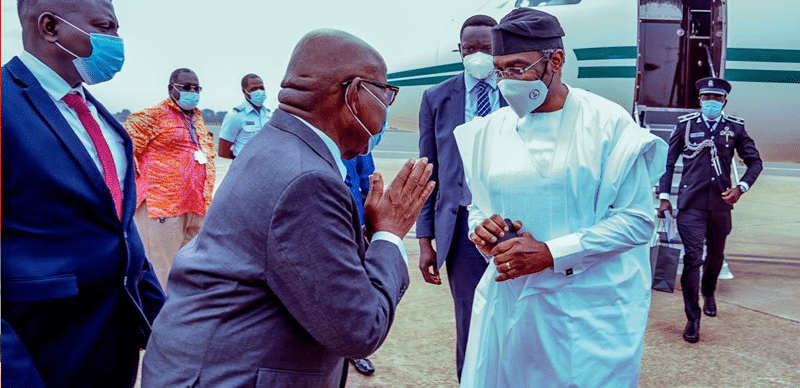The recent visit to Ghana by the Speaker of House of Representatives, Mr Femi Gbajabiamila to Ghana helped change the basis of the trade war between Ghanaian and Nigerian spare parts dealers in that country, according to the Nigerians in Diaspora Organisation (NIDO), Ghana chapter.
Vice-President of NIDO-Ghana, Mr Kingsley Attoe, who disclosed this in a telephone interview with the News Agency of Nigeria (NAN) on Saturday, praised Gbajabiamila for intervening, saying it was timely.
“Currently, Nigerians are waiting to see the outcome of the meetings he had.
“Two days ago, he met the speaker and Nigerian traders separately. Yesterday, he met with Nigerian business executives.
“There are talks about setting up a Nigeria-Ghana Business Council with the hope of domesticating it in both countries.
“NIDO believes more still has to be done. The problem is less of government-to-government but more of people to people.
Read Also: Pharmacist expresses wish to ‘eliminate’ Buhari, Abba Kyari, gets detained for 6 months
“We need to look for a way to sensitise citizens of both countries to the need for Ghanaians to understand Nigerians and encourage Nigerians to invest more in their country,” Attoe said.
He expressed the hope that the Gbajabiamila’s visit would lead to the amicable settlement of the issues at stake between the Nigerian Union of Traders Association in Ghana (NUTAG) and the Ghana Union of Traders. (GUTA)
NAN reports that in the course of his visit to Ghanan on Thursday, Gbajabiamila called on the Ghanaian government to review the law requiring businesses to have a capital base of one million dollars before they can start business, a provision, which Nigerian traders find very stringent and an attempt to discourage them from doing business in Ghana.
“We encourage you to revisit the component of the law that requires a capital base of $1,000,000.
“We are all African. We all have towns and villages and know only too well that the majority of our traders across the continent are petty traders.
“The prospects of them being able to raise a capital base of one million dollars before they can trade in goods that maybe worth less than one thousand dollars clearly is a major challenge,” he said. (NAN)

